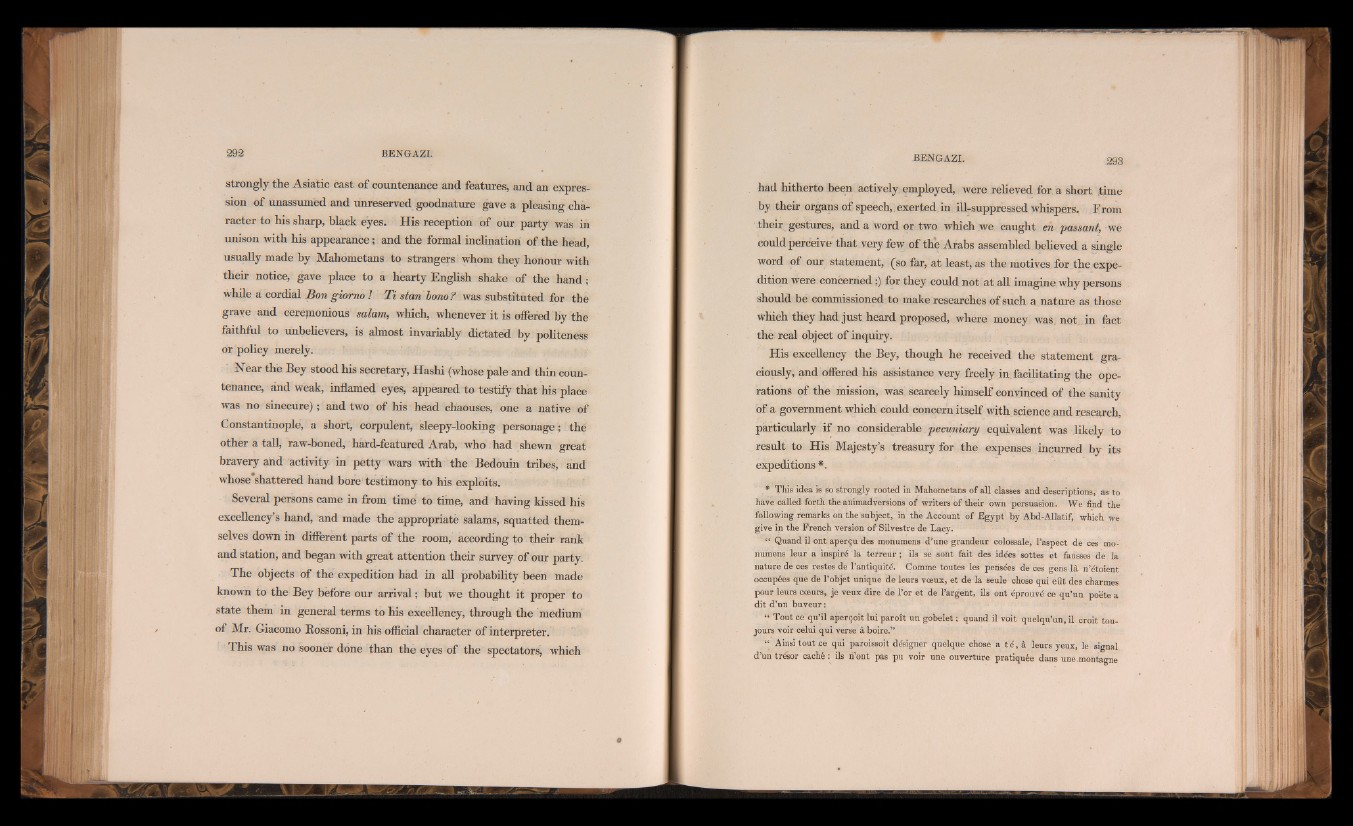
strongly the Asiatic east of countenance and features, and an expression
of unassumed and unreserved goodnature gave a pleasing character
to his sharp, black eyes. His reception of our party was in
unison with his appearance; and the formal inclination of the head,
usually made by Mahometans to strangers whom they honour with
their notice, gave place to a hearty English shake of the hand;
while a cordial Bon giomo ! Ti stan hono? was substituted for the
grave and eerepionious salam, which, whenever it is offered by the
faithful to unbelievers, is almost invariably dictated by politeness
or policy merely.
Near the Bey stood his secretary, Hashi (whose pale and thin countenance,
and weak, inflamed eyes, appeared to testify that his place
was no sinecure); and two of his head chaouses, one a native of
Constantinople, a short, corpulent, sleepy-looking personage; the
other a tall, raw-boned, hard-featured Arab, who had shewn great
bravery and activity in petty wars with the Bedouin tribes, and
whose shattered hand bore testimony to his exploits.
Several persons came in from time to time, and having kissed his
excellency’s hand, and made the appropriate salams, squatted themselves
down in different parts of the room, according to their rank
and station, and began with great attention their survey: of our party.
The objects of the expedition had in all probability been made
known to the Bey before our arrival; but we thought it proper to
state them in general terms to his excellency, through the medium
of Mr. Giacomo Bossoni, in his official character of interpreter.
This was no sooner done than the eyes of the spectators, which
had hitherto been actively employed, were relieved fora short time
by their organs of speech, , exerted, in ill-suppressed whispers. From
their gestures, and a word or two which we caught en passant, we
could perceive that very few of the Arabs assembled believed a single
word of our statement, (so far, at least, as the motives for the expedition
were concerned ;) for they could not at all imagine why persons
should be commissioned to make researches of such a nature as those
which they had just heard proposed, where money was. not in fact
the real object of inquiry.
His excellency the Bey, though he received the statement graciously,
and offered his assistance very freely in facilitating the operations
of the mission, was; scarcely himself convinced of the sanity
of a government which could concern itself with science and research,
particularly if no considerable pecuniary equivalent was likely to
result to His Majesty’s treasury for the expenses incurred by its
expeditions *.
* This idea is so strongly rooted in Mahometans o f all classes and descriptions, as to
have called forth the animadversions of writers of their own persuasion. We find the
following remarks on the subject, in the Account of Egypt by Abd-Allatif, which we
give in the French version of Silvestre de Lacy.
“ Quand il ont aperçu des monumens d’une grandeur colossale, l’aspect de ces mo-
numens leur a inspiré la terreur ; ils se sont fait des idées sottes et faüsses de la
nature dé ces restes de l’antiquité. Comme toutes les pensées de ces gens-là n’étoient
occupées que de l’objet unique de leurs voeux, et de la seule chose qui eût des charmes
pour leurs coeurs, je veux dire de l’or et de l’argent, ils ont éprouvé ce qu’un poëte a
dit d’un buveur :
“ Tout ce qu’il aperçoit lui paroît un gobelet ; quand il voit quelqu’un, il croit toujours
voir celui qui verse à boire.”
“ Ainsi tout ce qui paroissoit désigner quelque chose a té , à leurs yeux, le signal
d’un trésor caché : ils n’ont pas pu voir une ouverture pratiquée dans une .montagne